- Home
- Wendell Berry
The Selected Poems of Wendell Berry Page 34
The Selected Poems of Wendell Berry Read online
Page 34
When they got to the house it was almost nightfall. Wheeler left the mare standing at the back door while he helped Uncle Peach into the house. It was a bachelor’s house, rudimentary, spare, unadorned, and, on top of that, a mess, for as he always did, Uncle Peach had lost interest in housekeeping as he gained interest in travel. Wheeler led him to a chair, and then he straightened the bedclothes on the bed and took off Uncle Peach’s shoes and helped him to lie down.
In the failing light he drove the mare to the barn, unhitched her, watered her at the cistern trough, unharnessed and fed her. She applied herself to her supper as though all were well.
Uncle Peach’s little farm had always endeared itself to Wheeler, and he could remember when Uncle Peach had kept it moderately well. Now, like Uncle Peach himself, it was running down. The fences barely served to contain and the brushy pastures to feed the one old mare. The garden was ragged with tall frost-killed weeds. The tobacco crop was hanging cured in the barn, poorer than the year.
Lying on the bed in the lamplight, Uncle Peach looked like a corpse, and lay as still as one. Wheeler stood and watched him a moment to make sure he was breathing. And then he lighted a lamp in the kitchen and moved around for some time, straightening the place up. He drew a fresh bucket of water from the well, drank, and built a fire in the cooking stove. But when he searched the kitchen for food he found nothing except—under a cloth spread over the table—a jar of jam, half a can of pork and beans covered with gray mold like a mouse’s pelt, and most of a box of stale crackers.
“Well, damn it!” he said, for he was hungry himself, and he knew he needed to get something in the way of food into Uncle Peach. He lighted the lantern that he found beside the woodbox, and went out. Searching the henhouse, the hayloft, and every trough and manger in the barn, he found five eggs.
As he walked back to the house, carrying the eggs in his hat, peering beyond the lantern light into the dark, and the rising wind, it seemed to him strange beyond belief that he was where he was, doing what he was doing. It seemed to him that he was still in his leap, still falling, still attached to Uncle Peach, who was still falling. Sooner or later they would hit bottom together and could start climbing out. He did not know when. He did not know how he was going to get back to his car. All the world to him now was the darkness and the wind, himself and Uncle Peach—two needy men and five eggs. Between the stars and the ground the only lights he could see were the lantern he carried and the windows of Uncle Peach’s house. The only sound was the long breath of the wind in the top of the old locust by the back door. He no longer thought of telling his story to Bess. He only missed her. He missed his life.
He was glad to get back inside, where the stove had made it warm. He scrambled the eggs, and warmed some of the crackers in the oven to make them crisp again. He got Uncle Peach up and fed him, and ate what was left himself. He found clean sheets and remade the bed, and helped Uncle Peach to undress and get under the covers. He quickly washed the dishes they had used, thinking to have a little time, finally, to sit down in and be still.
But Uncle Peach began to dream bad dreams, struggling and crying out in his sleep: “Oh! Lord God, I see him a-coming! On his old smoky horse!” And Wheeler lay down beside him to quiet him. For a while he did sleep quietly, and then his dreams returned again. Wheeler was awake for hours, soothing and consoling Uncle Peach when he fretted and muttered and cried out, struggling with him when he fought.
And so they waged the night, Uncle Peach striving with the Devil, Wheeler striving with Uncle Peach. It seemed to Wheeler that the two of them were lost together there in the dark house in the dark sky. He could not have told the time within three hours.
Once, after they had passed through yet another nightmare, Uncle Peach, who had momentarily waked, said slowly into the darkness, “Wheeler boy, this is a hell of a way for a young man just married to have to pass the night.”
“I thought of that,” Wheeler said. “But it’s all right.” And he patted Uncle Peach, who went back to sleep and for a while was quiet.
Later, Wheeler himself went to sleep, his hand remaining on Uncle Peach’s shoulder where it had come to rest.
And that is where daylight found him, far from home.
Nearly to the Fair (1932)
IN THE neighborhood of Cotman Ridge and Goforth, and even as far away as Port William, Ptolemy Proudfoot had earned a small fame as a horseman. He never had need on his ninety-eight acres for more than three horses at once, and had rarely owned a brood mare; still, it was understood around and about that Tol was a good judge of horses and that he “had a way” with them. He was a good hand to break a colt, and he had been known to take an older horse that was spoiled or mean and settle him down to a life of useful citizenship. People knew that in his dealings with horses Tol could accomplish pretty much what he wanted or needed to, and without so much as raising his voice. “He was half horse himself,” Sam Hanks liked to say.
He always kept as a work team a well-matched pair, usually of geldings, grays if he could find them. And he kept a somewhat lighter third horse that he drove to his buggy, and used with his team on the cutting harrow or breaking plow. The buggy horse, like the workhorses, would be a good one, and when Tol and Miss Minnie set out for town or for church, they traveled in some style. They looked, perhaps, as any moderately prosperous farm couple of that time and place would have looked, except for one thing. Tol, who was large in all dimensions, weighed in the neighborhood of three hundred pounds and Miss Minnie never more than about ninety, and so, when they traveled together in the buggy, the buggy leaned to Tol’s side and Miss Minnie, as a consequence, always sat very close to Tol. Fortunately, Miss Minnie felt romantic about Tol—he was her bulwark, she said; it was not merely gravity that drew her to his side. But perhaps it was not ordinary in their time and place for a couple on the far side of middle age to sit as closely together as Tol and Miss Minnie did.
On his part, Tol’s affection for Miss Minnie was always somewhat breathlessly mingled with awe. Miss Minnie had been a schoolteacher, and Tol looked up to her for her book learning and her correct grammar. For him, a certain romance adhered to their marriage because of his conviction that she was above him, that she deserved not only all he could do for her, but more.
And that, probably, is why he bought the little Model A coupe in 1929, just before the Depression. Tol, I think, would have been satisfied to stick to his horse and buggy for the rest of his days. Traveling in cooperation with a good horse interested him more than any other form of travel could have done. When they drove together he was in the habit of saying to Miss Minnie from time to time, gesturing toward Ike or Fiddler or Redbird or Sunfish or Hickory, “He’s a good one, ain’t he?” or “Stepping out now, ain’t he?”—just as he liked often to say to her, when they had been away and had come back into sight of their neat gingerbreaded house and its outbuildings that stood just where the Goforth Hill road dropped down off Cotman Ridge toward Goforth in the valley, “Now I wonder who lives in that pretty place.”
But Tol was no stranger to the fact that automobiles had come to be the thing. It got so that almost every time they went onto the road they met one—if it was good weather, that is, and the road was passable for automobiles. When they went down to Goforth to church, there several automobiles would be, not lined up at the hitch rail, but scattered hither and yon, not needing to be tied to anything when you were not using them. Even old Uncle Arn Ekrum had bought one; when it threatened to rust, he had covered it with a coat of whitewash so that now it looked like a ghost. And it came to Tol that Miss Minnie, abreast of things as he knew her to be, undoubtedly longed secretly in her heart to ride in an automobile of their own.
Tol could not bear the thought that Miss Minnie might long secretly in her heart for anything that he could provide. And so the next time they went to Hargrave—a trip they didn’t make but two or three times a year—Tol, speaking of a “surprise” he said he had for her, and reveali
ng his own excitement by a smile that made his face shine like a ripe tomato, drove her to the place where a man sold automobiles and, stopping in front of a glossy Model A coupe, merely held out his hand, palm open, like Columbus presenting the New World to the Queen of Spain. And Miss Minnie—who despite Tol’s suspicions had never dreamed of owning an automobile, who in fact loved Tol’s way with a horse and loved to sit beside him while he drove, and who, now that she was suddenly face-to-face with a car of their own, thought it the homeliest black bug she had ever seen—assuming that it was something that Tol had longed for secretly in his heart, said, “Why, Mr. Proudfoot, it is perfectly beautiful!”
The next day the salesman delivered the car and taught Tol how to drive it: how to start it by twisting its crank, how to guide it by twisting its steering wheel, how to make it go forward and backward. Tol did not know what to expect it to do next. But he got good enough finally to drive it three times slowly around the front pasture and then out the gate and down the road to Goforth, and then back up the hill and into the yard again, with the salesman beside him, smiling and saying, “You’re getting the hang of it, sir. Just go easy.”
And so Tol and Miss Minnie went easy into the modern world, never really getting the hang of it. She sat close to him in the Model A as she had in the buggy, because of the same conditions of gravity and attraction. And in the automobile, as in the buggy when the horse trotted, she always held her hat on with one hand, even when the windows were shut. All the neighbors, except when they had to meet him in the road, enjoyed watching the way Tol drove, as later they would enjoy remembering it. When Tol traveled by horse and buggy, his horse stayed in the road more or less on his own, leaving Tol free to look around. Though the Model A required much more supervision than a horse, Tol still spent a good deal of time looking around. It would have seemed to him a discourtesy to travel through the country without looking at it. His course therefore involved a series of strayings to one side or another, alternating with sudden corrections. The corrections were usually inspired by the warnings of Miss Minnie, who always spoke in the nick of time (who, on those journeys, lived in the nick of time), and who nevertheless retained to the end of her days an almost devout admiration of Tol’s ability to run an automobile.
Because they never entirely trusted their new machine, which Tol always referred to as “the Trick,” and because they had an almost superstitious fear of getting it wet or muddy, they kept their horse and buggy for use in emergencies and when the weather was bad and when Tol needed to go somewhere by himself, for he would not go anywhere in the Trick without Miss Minnie. And so the Model A stood in the wagon shed as innocent of rain or mud as a pet canary, and gleaming as on the day it was new, for Miss Minnie went over the outside of it almost every day with her dust mop.
Having an automobile might have caused them to think many thoughts that they had never thought before, but in fact it only caused one such thought. For the most part, they continued in their familiar, modest, frugal ways. They went to Port William to shop and visit a while on Saturday afternoon. They went down to Goforth to church on Sunday. They went to a neighbor’s sometimes and sat till bedtime, or some of the neighbors would come to sit with them. And pretty often they would have company and Miss Minnie would load the table with one of her bountiful meals, and these were Tol’s favorite occasions, for he loved food and talk and laughter. In the fall Tol would go to Hargrave to market his tobacco crop. He would go to the stockyards at Louisville in June to sell his lambs, and again in November to sell his steers. Occasionally Miss Minnie and the other women of the Missionary Society would hold a bake sale. But mostly she and Tol stayed home and stayed busy in the leisurely way of people who know exactly what they have to do and how to do it and have got used to doing it, and who don’t have to do too much.
The one thought that the automobile caused them to think was the thought of the State Fair, which took place in Louisville at the end of every summer. They had heard of the Fair, and they had dreamed of it. They had heard of the perfect ears of corn laid side by side in rows, and of the perfect garden vegetables, the fruits and the canned goods, the needlework, the flowers; of the cages of beautiful chickens and ducks and geese, of guinea fowl and pigeons, of turkeys bronze and white; of ranks of fine cattle, and pens of excellent sheep and hogs; of the mule show and the horse show. Tol and Miss Minnie knew what good things were, and they had but to close their eyes to see them at the Fair as they must have been: all the produce of the cultivated earth, perfect in all its shapes and colors, cherished and gleaming. But they had never seen it with their own eyes. They had never gone.
But now that they possessed an automobile, they could think of going, for the world had changed. Now they could think of going fifty miles to the Fair and fifty miles home again on the same day, and only because they wanted to. It fairly took their breath. They talked about it for three years.
“If we wanted to go,” Tol said prophetically to Miss Minnie, “the Trick could take us there.”
“Yes, it’s the modern world now,” Miss Minnie replied. “People do such things.”
But the truth was that in his heart Tol knew he belonged to an older world, and he was afraid. For him, to walk the aisles of the great exhibit halls among fruits and vegetables grown splendidly ripe, and to see the good animals fed and groomed to a royal excellence, would have been to set foot in Eden itself. But now, as never before, the thought of these things set off a tremor of anxiety in his mind. Getting there would be the problem.
And then one day something happened that enabled Tol Proudfoot to think of getting there. It was the middle of the summer, and Tol had walked through the field to Corbin Crane’s to see if he could borrow back the corn planter that Corbin had borrowed from him in the spring. He thought that if he came walking, Corbin might offer to bring the planter home with his own team rather than wait, as he usually did, for Tol to come with his team to get it. Tol had thought it best to ask for the return of the planter several months ahead of time because if he knew Corbin, the planter would need fixing before it could be used. Corbin was hard on tools, as he was on everything else, which was perhaps why he saw fit to get along without any of his own.
He did, however, own a car. And when Tol came over the ridge, he saw the car running at what appeared to be terrific speed around the corner of the barn. It made a big loop in the pasture, disappeared again around the same corner of the barn, and reappeared in the lane, heading out toward the road gate. It disappeared again, and then in a few minutes it came back into sight, going backward nearly as fast as it had gone forward.
Tol, who had continued walking, stopped then and stood by the lane where it came up between the house and the barn. When the car flew backward past him, he hollered, “Whoa!” and the car stopped. Behind the wheel Tol saw his friend Elton Penn, Corbin Crane’s stepson. Elton was twelve years old that summer, and as he raised his hand in greeting to Tol he had a grin on his face that could have been distributed among three or four boys and still showed them all to be in a good humor.
“Want a ride?” Elton said.
“No, thanks. Not today,” Tol said. “Where’s Corbin?”
“Over to Braymer Hardy’s, putting up hay,” Elton said.
“Your mammy, too?”
Elton nodded.
“I thought so.”
“They sent me home to milk.”
“Well, why ain’t you milking?”
Tol knew what Elton was doing. He was not just enjoying himself; he was taking revenge on Corbin Crane, who did not like him and was mean to him. It was because of Corbin’s meanness to Elton that Tol and Elton had got to be friends.
One day Tol had stopped to talk to Corbin when Corbin and Elton were hoeing tobacco. While the two men talked, Elton, who was only about nine at the time, got to fiddling with the water jug, and he dropped it. It didn’t break, but some water spilled, and Corbin turned around and cracked Elton across the wrist with his hoe handle. It was a hard
reckless lick, and Elton started to cry.
Tol heard no more of what Corbin was telling him. He reached down with his big old hand and picked up Elton’s hand and led him away.
“If you don’t mind,” he said, not looking back at Corbin Crane, “I’m going to borrow this boy for a while.”
They walked along together, Tol not saying anything, and Elton blubbering and sniffling. After a while Elton said, “Someday I’m going to kill that son of a bitch.”
“Aw, son,” Tol said, “you don’t want to do that.”
“I taken a shine to the boy,” Tol told Miss Minnie later that day, meaning that from then on he was going to be Elton’s friend.
And they were friends from then on. Tol would pay Elton a dime or a quarter to help him out with some job. Or Miss Minnie would make cookies and lemonade, and they would call Elton on the party line to come over and play croquet. And often at night Tol would call Elton up and play Miss Minnie’s Victrola for him over the telephone. A many a night Elton stood by the wall with the receiver to his ear, listening to “Mother Machree” or “There’s a Cradle in Carolina” or, his and Tol’s favorite, a song called “Nothing but Something Cool.”
Once Tol offered Elton a dime to split a pile of stove wood. The wood split hard and the job took Elton a long time. Tol paid him his dime, and then showed him how to play the game of heads-or-tails.
“Now,” Tol said, “look. If we bet a dime and you win, you’ll have two dimes instead of one.”
“All right,” Elton said.
So they flipped.
“Call it,” Tol Proudfoot said.
“Tails—wup—I mean heads!” Elton said.

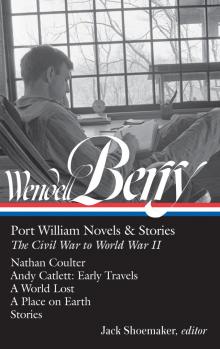 The Selected Poems of Wendell Berry
The Selected Poems of Wendell Berry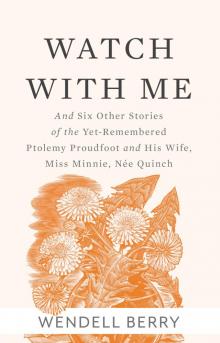 Watch With Me
Watch With Me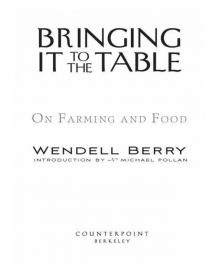 Bringing It to the Table: On Farming and Food
Bringing It to the Table: On Farming and Food Hannah Coulter
Hannah Coulter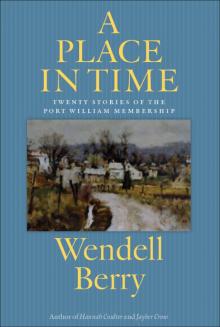 A Place in Time: Twenty Stories of the Port William Membership
A Place in Time: Twenty Stories of the Port William Membership Nathan Coulter
Nathan Coulter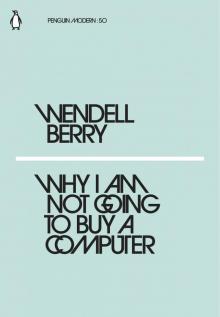 Why I Am Not Going to Buy a Computer
Why I Am Not Going to Buy a Computer A Place on Earth
A Place on Earth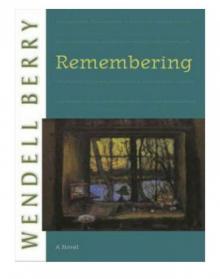 Remembering
Remembering New Collected Poems
New Collected Poems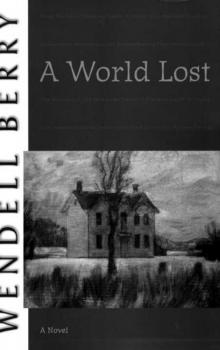 A World Lost
A World Lost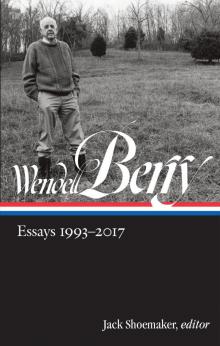 Wendell Berry
Wendell Berry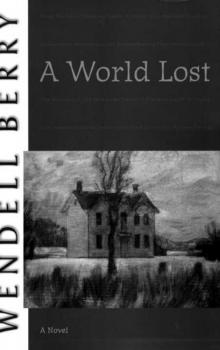 A World Lost: A Novel (Port William)
A World Lost: A Novel (Port William)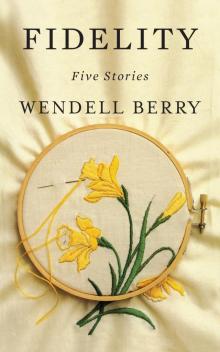 Fidelity
Fidelity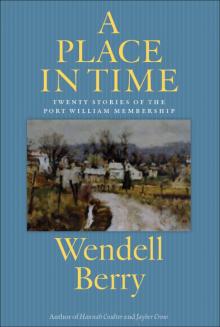 A Place in Time
A Place in Time